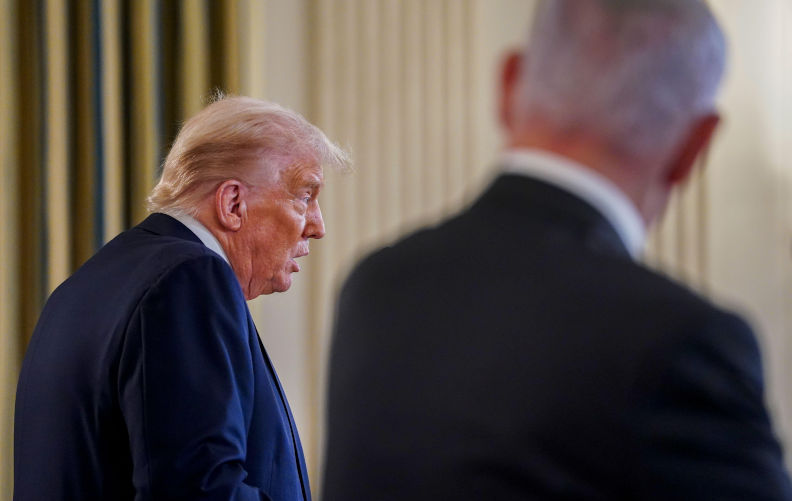Trump’s mongrel punt
October 2, 2025
In the Australian vernacular, a mongrel punt is an erratic kick forward of a football which leaves those participating in the game with an awkward choice between contesting possession (possibly at the cost of broken fingers) and waiting to see where the ball bounces.
The Trump plan is indeed a mongrel.
It offers immediate relief to Palestinians by ending the slaughter in Gaza. And, on the hostage front, it marks the first serious attempt to return to the possibility of a negotiated release of all those who remain alive. In an advance from previous positions enunciated by President Trump, it undertakes to prevent the displacement of Palestinians from Gaza and promises there will be no Israeli annexation of the West Bank. But it offers nothing on other Arab demands for a two-state solution, notably integration between Gaza and the West Bank in a Palestinian state, and full Israeli withdrawal.
For both Israel and Hamas, the only thing worse than accepting Trump’s Gaza plan would be rejecting it.
Overwhelmingly, the terms of the plan favour Israel.
In the absence of any provision for US enforcement of the deal, Israel would be left with the ability to interpret, according to its own discretion, the standards and timelines to be met for any Israeli withdrawal, let alone any transfer of authority to the Palestinian Authority.
Absent any US guarantees to the contrary, Israel will retain arbitrary control over humanitarian aid and population movement. It will continue, in practice, to impede the functioning of UN agencies, including UNRWA to which Israel is viscerally opposed.
The plan is also so clearly divorced from Palestinian and Arab realities as to be almost laughable.
There is no clarity surrounding the relationship of the stabilisation force — which is supposed to provide security and monitor disarmament, operating under some sort of “deconfliction” mechanism — to the US-appointed, Israeli-endorsed, externally-located civilian governing body to be established under the plan.
Accordingly, it is unclear who is to undertake the disarming of Hamas – and Arab Governments have made it clear it won’t be them.
Israel, meanwhile, will almost certainly operate without restraint in Gaza under the pretext of security concerns. According to press reports, it will continue “targeted operations to prevent the resurgence of terrorist groups”, as has become its habit in the West Bank.
However, as the Palestinian Authority has found in the West Bank, the credibility (and security) of any stabilisation force that does not act with lethal force to protect Palestinians from such Israeli operations will not last long.
It remains to be seen whether the military assault on Gaza would be resumed were the hostages to be released. The shift in global opinion against Israel, especially in the UN, and delicate management of relations with the White House, amidst growing domestic criticism in the US of the relationship with Israel, would seem to weigh against that possibility in the near term. But balanced against those considerations is the fact that Netanyahu’s political survival depends upon retaining his coalition partners. Key Cabinet ministers and their supporters have made clear their expectation that the war should continue.
A stand-off with Hamas, possibly an enduring one, the return of hostages, and promises to his coalition partners that a return to the war is all but inevitable, would seem likely to suit Netanyahu best as he navigates his way through the political minefield.
Like Netanyahu, Hamas will be under pressure from Qatar and Egypt to give formal agreement to the plan, after a face-saving period of consultation with its military wing. But it will take every opportunity to avoid fulfilling its obligations, especially in regard to demobilisation and disarmament. It will also do its best to ensure that no Palestinian alternative to its rule emerges, even though it may agree not to exercise any formal role itself.
Although they may be willing to sponsor surrogates, any suggestion that Arab Governments would be willing to engage directly in military confrontations with Hamas in Gaza on Israel’s behalf can be dismissed. And a couple of newly-formed police battalions and a clutch of clan-based militias sponsored by Israel and the remnants of Fatah in Gaza would have no chance against the motivated, disciplined, battle-hardened forces Hamas could still mount if required.
Accordingly, unless responsibility for such matters is passed to UNRWA (which has the stature, political skills and experience to address the problem better than anyone else), there will be no reconstruction, humanitarian relief, or basic functions including health and education restored in Gaza without the delivery of those programs accommodating the reality that Hamas is inextricably part of Palestinian society.
It has, and will retain, the determination and capacity to make any alternative unworkable, should it choose to do so.
The prospect, therefore, is for Trump’s long-awaited plan to produce a return to a ceasefire for the next few months, at least, and for the hostages to be released. Those are welcome developments, especially for Gaza’s civilians. But there is no roadmap to ending the war.
The intensity of the conflict may abate, and focus may shift to the rapidly deteriorating situation facing the Palestinian Authority in the West Bank, but Israelis and Palestinians will remain no closer to resolving the core problem of the occupation, and the consequences — for them and for the international community — arising from it.
The views expressed in this article may or may not reflect those of Pearls and Irritations.


